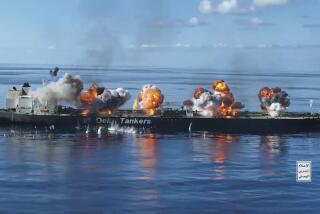Another merchant ship is seized off Africa
- Share via
BEIRUT, EDMUND SANDERS AND NAIROBI, KENYA — Pirates prowling the treacherous waters off the Horn of Africa hijacked another merchant ship Tuesday -- at least the second in four days -- amid growing international concern about a 21st century version of an ancient security threat.
The Hong Kong-flagged cargo ship Delight and its 25-person crew were captured late Tuesday morning off the coast of Yemen, Beijing’s New China News Agency reported, citing the China Maritime Search and Rescue Center. It was hauling 36,000 metric tons of wheat to the Iranian port of Bandar Abbas, the news service reported.
U.S. forces in the Middle East confirmed the hijacking but could provide no further details.
Meanwhile, the 1,000-foot-long Sirius Star, a massive oil tanker hijacked by suspected Somali pirates Saturday, was moored off the central coast of Somalia, the boat’s operator said. The ship was anchored Tuesday several miles offshore, within sight of a Somali fishing region considered a haven for seafaring bandits, the U.S. military in the Middle East said.
“The ship is anchored off the coast near Harardhere, a traditional pirate stronghold,” said Navy Lt. Nathan Christensen, spokesman for the U.S. 5th Fleet, based in the Persian Gulf nation of Bahrain.
Piracy in the Indian Ocean, Arabian Sea and Gulf of Aden has become a scourge, threatening shipping lanes and driving up insurance costs. The pirates often stage their heists from Somalia, a lawless country with a weak central government that is grappling with a violent Islamist insurgency. Using speedboats that swarm the targets, the machine-gun-toting pirates take control of merchant ships and then hold the vessels, crew and cargo for ransom.
In addition to the Sirius Star and Delight, the International Maritime Bureau has reported at least eight other attacks by pirates on shipping in the region since the beginning of last week, most of them warded off by seamen aboard the targeted vessels.
In an interview with The Times in Nairobi, Kenya, shortly after the hijacking of the Sirius Star was announced, Somali Prime Minister Nur Hassan Hussein bemoaned the effect of piracy on his nation, which is already beset by poverty, hunger and rebellion.
“Piracy is disturbing everything in Somalia, disturbing normal life, disturbing trade and commerce, disturbing the movement of humanitarian aid,” he said Tuesday.
Hussein praised the stepped-up response by the international community, which has included the dispatch of warships from the North Atlantic Treaty Organization. “We are happy to see the international community really trying to intervene,” he said. “I hope this will produce some positive effects.”
Officials of the Saudi Arabian company operating the Sirius Star scrambled to secure the crew, the $120-million ship and up to 2 million barrels of oil worth more than $100 million.
“Our first and foremost priority is ensuring the safety of the crew,” Salah B. Kaaki, president and chief executive of Dubai, United Arab Emirates-based Vela International Marine, a subsidiary of Saudi oil giant Aramco, said in a news release.
Vela said the Liberian-flagged tanker’s 25-member crew consisted of 19 Filipinos, two Britons, two Poles, a Saudi and a Croat.
“We are in communication with their families and are working toward their safe and speedy return,” Kaaki said. The statement said the company was awaiting further contact from the pirates in control of the vessel, which maritime experts say might be the largest ship ever hijacked.
The U.S. dispatched warships to monitor the Ukrainian-flagged merchant ship Faina, which was loaded with tanks and other weapons, after it was seized by Somali pirates in September. The ship remains under their control. But Christensen said neither the U.S. nor other Western forces in the region planned to dispatch ships to monitor either of the recently seized vessels.
In contrast to the Delight and the Sirius Star, “the Faina represents a clear and present danger and a direct threat should the weapons and cargo fall into the wrong hands,” he said in a telephone interview.
The wave of piracy was the topic of one session at the two-day Maritime Security Expo in Long Beach, which opened Tuesday. Observers peppered experts with questions: What kinds of ships are the Somalis after? When are the attacks most likely to occur and where?
Among other things, they were told that the Gulf of Aden and Red Sea trade routes mainly involved Asia-to-Europe cargo and not ships bound for the U.S., although the hijacked tanker was headed to the U.S. Gulf Coast.
Kim Hall, a field representative for the Center for Naval Analyses, stationed at U.S. Naval Forces Central Command in Bahrain, said the Somalis had no preference in the kind of vessels they seized. Describing them as “pretty fearless,” she said, “Whatever they come across, they attack.”
--
edmund.sanders@latimes.com
Times staff writer Ronald D. White in Long Beach contributed to this report.
More to Read
Sign up for Essential California
The most important California stories and recommendations in your inbox every morning.
You may occasionally receive promotional content from the Los Angeles Times.













